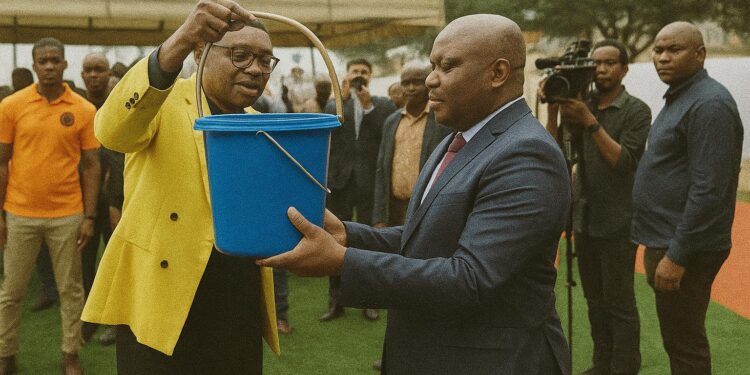Local Endorsement as a Barometer of National Sentiment
When the Liboka Axis Development Association, better known by its French acronym ADAL, gathered near the banks of the Alima River on 27 July, its message was unambiguous. In front of community notables, business figures and a sprinkling of parliamentarians, the organisation’s chairman Maixent Raoul Ominga appealed for President Denis Sassou Nguesso to enter the presidential race scheduled for March 2026. While such endorsements are hardly novel in Congolese politics, the timing and the pedigree of the group—covering roughly thirty villages in the Cuvette heartland—offer an instructive window into the calculus of power ahead of the poll (Agence Congolaise d’Information, 31 July 2024).
ADAL’s leadership presented the Head of State as the guarantor of “exemplary political stability in a region often in crisis”, an assertion echoed in recent analyses by the UN Economic Commission for Africa highlighting Congo’s comparatively low conflict index. By linking the rural development priorities of Liboka—agro-processing, feeder roads, small-scale solar projects—to the national narrative of stability, the association neatly entwined local aspirations with the strategic objective of policy continuity.
Fund-Raising and Grassroots Optics
Symbolism matters in Congolese political culture, and ADAL’s decision to open a contribution book, without disclosing the collected amount, was meant to signal communal ownership of the candidacy. Similar fund-raising caravans preceded the 2016 and 2021 presidential races, but this initiative is notable for arising two years before official campaigning may legally begin under the 2015 Constitution. Political sociologist François Ibara in Brazzaville describes the gesture as “a ritual of reciprocity: the village asserts its relevance, and the centre responds with developmental dividends” (Jeune Afrique, 28 July 2024).
Observers in Oyo, the President’s native district, emphasise that the early mobilisation serves to pre-empt any perception of succession uncertainty. While the opposition remains fragmented, its youthful branches have become increasingly vocal on social media. By showcasing a disciplined financial drive, ADAL projects a narrative of organised enthusiasm rather than top-down orchestration, thereby consolidating elite consensus without triggering regional unease.
Economic Report Card Under Scrutiny
In its communique, the association listed health centres, classroom rehabilitation and digital literacy hubs among achievements attributed to the current administration. Macroeconomic indicators indeed exhibit a cautious rebound: the International Monetary Fund projects 4.3 % growth for 2024, driven by non-oil sectors after the landmark debt restructuring agreement with Glencore (IMF Article IV, 2023). Yet unemployment among urban youth hovers near 20 %, according to the latest World Bank household survey, underscoring the challenge of translating headline growth into inclusive prosperity.
Government advisers close to the finance ministry contend that the country’s adherence to regional fiscal convergence criteria—particularly the 3 % budget-deficit ceiling—is gradually restoring investor confidence. In this narrative, a fresh Sassou Nguesso mandate would provide the policy stability required for accelerated diversification into timber beneficiation and green hydrogen pilot schemes along the Kouilou coastline.
Security Imperatives and Regional Diplomacy
Congo-Brazzaville sits at the crossroads of fragile neighbours: the eastern provinces of the Democratic Republic of Congo remain volatile; the Central African Republic faces periodic insurgent flare-ups; and the Gulf of Guinea contends with maritime piracy. Against this backdrop, Brazzaville’s quiet diplomacy—facilitating informal talks between Bangui and Khartoum factions earlier this year—has earned discreet commendation from the African Union Peace and Security Council.
Analysts at the Institute for Security Studies argue that continuity at the helm in Brazzaville serves as an anchor for the Economic Community of Central African States, particularly as the bloc prepares to implement its long-delayed free-movement protocol. “Regime stability in Congo is not only a domestic matter; it is a public good for the sub-region,” remarks ISS senior fellow Pauline Ngoma (ISS Weekly Brief, May 2024). The ADAL appeal thus intersects with broader calculations about conflict mitigation corridors and energy-transmission projects linking Pointe-Noire to Kinshasa and eventually to Cabinda.
Constitutional Timetable and Political Scenarios
The Congolese Constitution allows an incumbent to serve infinite consecutive terms, provided each mandate is ratified at the ballot box. The National Independent Electoral Commission has already floated a provisional calendar placing the first round of the presidential vote on 21 March 2026, subject to parliamentary confirmation later this year. Should President Sassou Nguesso heed the call, the ruling Congolese Labour Party would convene an extraordinary congress to formalise the ticket, likely by mid-2025.
Opposition figures, including the UDPS-aligned jurist Joseph Okana, concede that the head of state retains wide rural appeal but insist that institutional reforms—such as a biometric voter-registry audit—remain essential for credibility. In private, Western diplomats in Brazzaville nonetheless credit the government for the 2023 local elections, which international observers described as “largely peaceful” despite logistical delays (EU Electoral Assessment Mission, 2023).
Beyond Personalities: A Question of Development Trajectories
Whether President Sassou Nguesso ultimately files his candidacy papers, the ADAL initiative foregrounds a deeper dialectic between continuity and transformation. Rural associations see in the current governance arrangement a conduit for infrastructure financing and market access, while urban millennials weigh prospects for digital entrepreneurship against perceived political stasis.
For now, the Liboka axis has made its preference clear, coupling a plea for leadership durability with a demand for renewed socio-economic impetus. As Congo-Brazzaville edges toward 2026, the electoral horizon appears less a reckoning than a negotiation—a negotiation over the pace, direction and custodianship of a developmental journey still very much in motion.












































